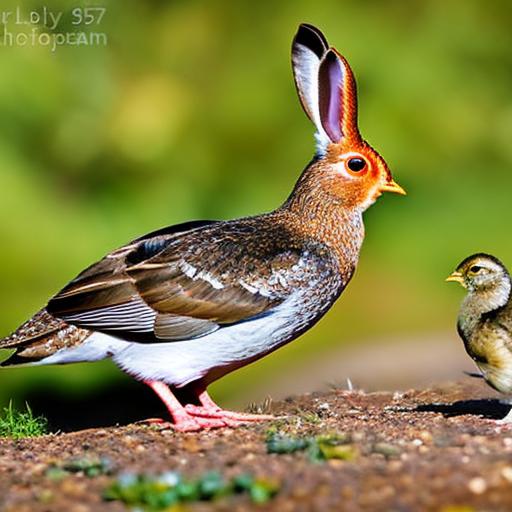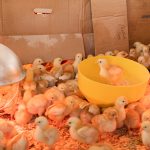Keeping rabbits and chickens together in one hencam can be a great way to maximize the benefits of both animals. Not only can they provide companionship for each other, but they can also help with pest control and fertilizing the soil. However, before making the decision to keep rabbits and chickens together, there are several factors that need to be considered. This article will explore the benefits of keeping rabbits and chickens together, as well as the factors to consider before making this decision.
Key Takeaways
- Rabbits and chickens can coexist in one hencam, but it requires careful consideration and planning.
- Keeping rabbits and chickens together can provide benefits such as pest control and companionship.
- Factors to consider before keeping rabbits and chickens together include space, temperament, and dietary needs.
- Choosing the right breeds of rabbits and chickens is important for successful coexistence.
- Designing a hencam that is suitable for both rabbits and chickens and maintaining a clean and healthy environment are essential for their well-being.
Benefits of Keeping Rabbits and Chickens Together in One Hencam
One of the main benefits of keeping rabbits and chickens together in one hencam is the companionship they can provide for each other. Rabbits are social animals and enjoy having company, so having chickens around can help reduce their boredom and provide them with stimulation. Similarly, chickens are flock animals and having rabbits around can provide them with companionship as well.
Another benefit of keeping rabbits and chickens together is their ability to help each other with pest control. Rabbits are natural grazers and can help keep the grass in check, while chickens are excellent at hunting insects and pests. By keeping them together, you can create a natural pest control system that benefits both animals.
Additionally, rabbits produce a lot of manure, which can be used as fertilizer for your garden. By keeping them in the same hencam as your chickens, their manure will mix with the chicken droppings, creating a rich compost that can be used to fertilize your plants. This not only reduces waste but also provides a natural and sustainable way to improve soil fertility.
Factors to Consider Before Keeping Rabbits and Chickens Together
Before deciding to keep rabbits and chickens together in one hencam, there are several factors that need to be considered. First and foremost is space. Both rabbits and chickens require adequate space to move around and exercise. It is important to ensure that the hencam is large enough to accommodate both animals comfortably.
Temperament is another important factor to consider. While rabbits are generally docile animals, some chickens can be more aggressive. It is important to choose chicken breeds that are known for their calm and friendly temperament to avoid any potential conflicts between the animals.
Dietary needs should also be taken into account. Rabbits have specific dietary requirements, including a high-fiber diet consisting mainly of hay and fresh vegetables. Chickens, on the other hand, require a balanced diet that includes grains, protein, and calcium. It is important to provide separate feeding stations for each animal to ensure they are getting the appropriate nutrition.
Choosing the Right Breeds of Rabbits and Chickens for Coexistence
Choosing the right breeds of rabbits and chickens is crucial for successful coexistence in one hencam. Some rabbit breeds are more docile and sociable, making them better suited for living with chickens. Examples of rabbit breeds that are known for their friendly temperament include the Holland Lop and the Mini Lop.
When it comes to chickens, there are several breeds that are known for their calm and friendly nature. Some examples include the Buff Orpington, the Australorp, and the Sussex. These breeds are less likely to exhibit aggressive behavior towards rabbits and are more likely to coexist peacefully.
It is also important to consider the dietary needs of both animals when choosing breeds. Some rabbit breeds have specific dietary requirements or may be more prone to certain health issues. Similarly, some chicken breeds may have different dietary needs or may be more susceptible to certain diseases. Researching and selecting breeds that are compatible with each other can help ensure a harmonious coexistence in one hencam.
Designing a Hencam that is Suitable for Both Rabbits and Chickens
Designing a hencam that is suitable for both rabbits and chickens is essential for their well-being. The hencam should provide enough space for both animals to move around comfortably. It should also have separate areas for feeding, watering, and nesting.
The hencam should also provide adequate shelter for both animals. Rabbits require a secure and enclosed area where they can retreat to when they feel threatened or need privacy. Chickens, on the other hand, need a coop with perches and nesting boxes where they can roost and lay eggs.
It is important to ensure that the hencam is predator-proof to protect both rabbits and chickens from potential threats. This includes securing the perimeter with sturdy fencing and using wire mesh to cover any openings or gaps.
Building a Chicken Coop for Your Hencam

Building a chicken coop that is suitable for both rabbits and chickens requires careful planning and consideration. The coop should be spacious enough to accommodate both animals comfortably. It should have separate areas for nesting, roosting, and feeding.
The coop should also have adequate ventilation to ensure good air circulation and prevent the buildup of ammonia from the animals’ waste. It is important to include windows or vents that can be opened or closed depending on the weather conditions.
The flooring of the coop should be easy to clean and maintain. It is recommended to use materials such as linoleum or concrete that can be easily washed and disinfected. This helps prevent the spread of diseases and parasites.
Essential Features of a Chicken Coop for Rabbits and Chickens
There are several essential features that a chicken coop should have to accommodate both rabbits and chickens. Nesting boxes are important for chickens to lay their eggs, while rabbits require a separate area with bedding material where they can burrow and feel secure.
Perches are another important feature of a chicken coop. Chickens naturally roost at night, and providing them with perches helps them feel safe and secure. Rabbits, on the other hand, do not require perches but may benefit from having platforms or shelves where they can rest and observe their surroundings.
It is also important to provide adequate lighting in the coop. Chickens require a certain amount of light to lay eggs, so it is important to have a light source that mimics natural daylight. Rabbits, on the other hand, do not have specific lighting requirements but may benefit from having a dimmer area where they can retreat to during the day.
Tips for Maintaining a Clean and Healthy Hencam for Rabbits and Chickens
Maintaining a clean and healthy hencam is essential for the well-being of both rabbits and chickens. Regular cleaning and monitoring can help prevent health issues and maintain a pleasant environment for both animals.
It is important to clean the hencam regularly, removing any soiled bedding, droppings, or uneaten food. This helps prevent the buildup of bacteria and parasites that can cause diseases. It is also important to regularly check for signs of illness or injury in both rabbits and chickens and seek veterinary care if necessary.
Providing fresh water is crucial for both animals. Water should be changed daily and containers should be cleaned regularly to prevent the growth of bacteria. It is also important to ensure that both rabbits and chickens have access to clean and fresh food at all times.
Regularly inspecting the hencam for any signs of damage or wear and tear is important to ensure the safety of both animals. Repairing any broken or damaged areas promptly can help prevent accidents or escapes.
Managing Feeding and Watering Needs of Rabbits and Chickens in One Hencam
Managing the feeding and watering needs of rabbits and chickens in one hencam requires careful planning and organization. It is important to provide separate feeding and watering stations for each animal to ensure they are getting the appropriate nutrition.
Rabbits require a high-fiber diet consisting mainly of hay and fresh vegetables. It is important to provide them with a constant supply of fresh hay and ensure they have access to fresh vegetables daily. Chickens, on the other hand, require a balanced diet that includes grains, protein, and calcium. It is important to provide them with a commercial chicken feed that meets their nutritional needs.
Watering stations should also be set up separately for rabbits and chickens. Rabbits require a constant supply of fresh water, while chickens need water for drinking and bathing. It is important to provide clean and fresh water at all times and regularly clean and refill the containers.
Enjoying the Benefits of Keeping Rabbits and Chickens Together in One Hencam
Keeping rabbits and chickens together in one hencam can be a rewarding experience that provides companionship, pest control, and soil fertility benefits. However, it is important to consider factors such as space, temperament, and dietary needs before making this decision.
By choosing the right breeds of rabbits and chickens, designing a suitable hencam, and maintaining a clean and healthy environment, you can enjoy the benefits of keeping these animals together. With proper care and attention, rabbits and chickens can coexist peacefully in one hencam, providing each other with companionship and contributing to a sustainable and enjoyable backyard farming experience.
If you’re considering keeping rabbits and chickens together in a hencam, you may also be interested in learning about the Chicken Coop Country Diner. This article from Poultry Wizard provides valuable insights into creating a cozy and functional dining area for your chickens within their coop. From choosing the right materials to designing a space-efficient setup, the Chicken Coop Country Diner offers practical tips to enhance your feathered friends’ dining experience. To read more about it, check out this article. Additionally, if you’re looking for ways to make your chicken coop more portable, the Chicken Coop Portage article is worth exploring. And if you’re concerned about keeping your chickens warm during colder months, the Heater for a Chicken Coop article provides useful information on selecting and using heaters effectively.
FAQs
Can rabbits and chickens live together?
Yes, rabbits and chickens can live together peacefully if they are introduced properly and have enough space to coexist.
What are the benefits of keeping rabbits and chickens together?
Keeping rabbits and chickens together can provide mutual benefits such as natural pest control, fertilization of the soil, and companionship for each other.
What are the risks of keeping rabbits and chickens together?
The main risk of keeping rabbits and chickens together is the potential for disease transmission between the two species. Rabbits can also be injured by the sharp claws of chickens, and chickens may peck at the fur or ears of rabbits.
How should I introduce rabbits and chickens?
Introduce rabbits and chickens slowly and gradually, allowing them to get used to each other’s presence before allowing direct contact. Provide separate areas for each species to retreat to if needed.
What kind of housing is suitable for rabbits and chickens?
Rabbits and chickens should have separate housing areas that are secure and predator-proof. They should also have access to outdoor areas that are fenced and protected from predators.
What should I feed my rabbits and chickens?
Rabbits and chickens have different dietary needs, so they should be fed separate diets. Rabbits require a diet high in fiber, while chickens require a diet high in protein. Consult with a veterinarian or animal nutritionist for specific dietary recommendations.
Meet Walter, the feathered-friend fanatic of Florida! Nestled in the sunshine state, Walter struts through life with his feathered companions, clucking his way to happiness. With a coop that’s fancier than a five-star hotel, he’s the Don Juan of the chicken world. When he’s not teaching his hens to do the cha-cha, you’ll find him in a heated debate with his prized rooster, Sir Clucks-a-Lot. Walter’s poultry passion is no yolk; he’s the sunny-side-up guy you never knew you needed in your flock of friends!







